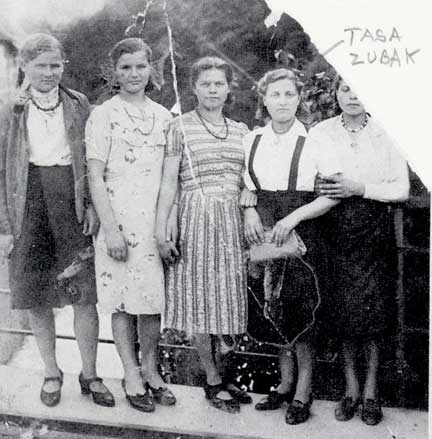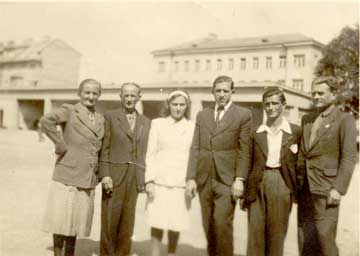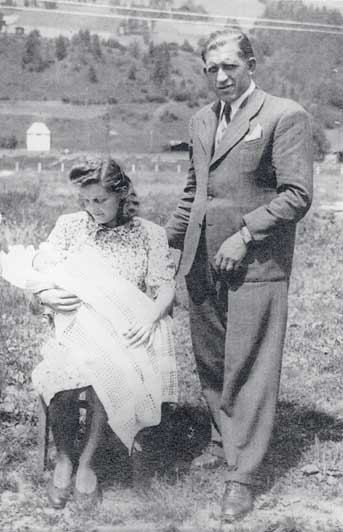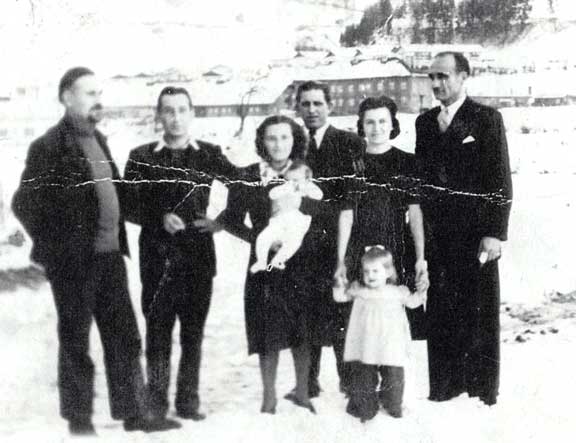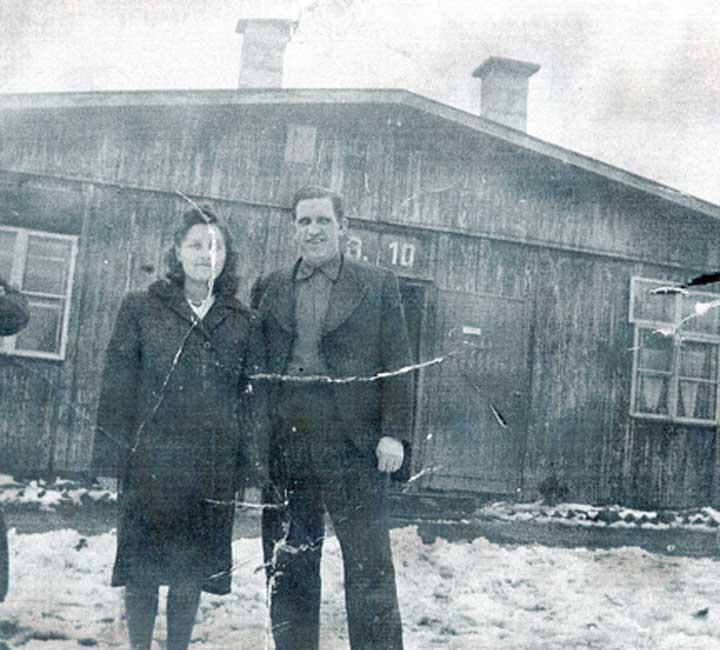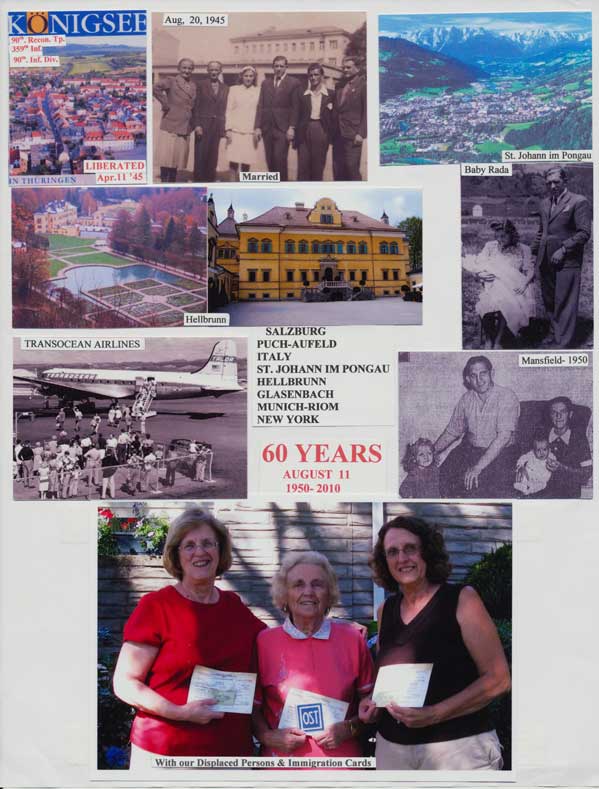Pongau
9/29/2012 Dear
Olga,
Spending the last couple years collecting documents and information
on my parents WW II experiences, I've compiled my story, thanks to
ITS, U.S. Holocaust Museum, dpcamps.org and others. On reviewing your site
recently, I've noticed others mention some of my parent's camps in Austria.
[Carol inquiring about Pongau, my parents spent a few years there, my sister
was born there]. 60
Years (below) tells
our story in general.
On the 60 year story their liberation was by the 90th Recon as the poster shows, not an armored unit who followed handing out chocolate -- loved them Americans. Mother says the German people were afraid of them but some helped.
Back
to DP Camps. Mother lost a baby boy a few weeks old probably in Markt
Pongau [UNRRA No. 18]. Are there any records available now of
births in the camps? I know many records are now becoming public [after
50 years] which is a big help. You understand when mother does talk about
things, she mixes them up. Old age too. I recently found another brother
who died in childbirth here in the U.S. I put a marker on his grave.
Don't mean to ramble but don't know where to begin to search UNRRA or
IRO records. Any help you can give would be deeply appreciated. Hope
this may help others.
Sincerely
yours, Dushanka Vlajic Donner davenduke@gmail.com
Olga's reply: Fill out form G639.
Photo one: Picture of mother's workmates in Konigsee after
liberation 4-11-45. Note: real shoes..
Photo two: My
parent's wedding, Gradimir Vlajic &Tasa Zubak,
Aug. 12, 1945, Lehener
Barricks, Salzburg, Yugoslav camp UNRRA
Team 324 LAGER PUCH-AUFELD. My
father, a tailor, made mother's wedding dress.
Photo three: My
parents, Gradimir and Tasa Vlajic with my sister,
Rada,
June 1947 in St. Johann im Pongau, UN DP camp No.18.
Photo one: My
parents, center couple, with me, baby Dushanka
Photo two: We
lived in Hellbrunn [home for expecting and new mothers then
for a few months, before moving across
river to Glasenbach when sponsored to U.S.
Photo three: This picture of my parents, Gradimir and Tasa Vlajic in
front of barricks probably at St. Johann im Pongau.
Rada
standing, in 1950 a few months before coming to U.S.
60 Years
By Dushanka Vlajic Donne
In 1941, Germany was aggressively expanding its frontiers. In Yugoslavia, the Nazis overwhelmed the 5th Yugoslav army as they stormed toward the capital. Gradimir Vlajic and 5000 fellow soldiers were captured. Before he reached Stalag XIA in Altengrabow, Germany [50 mi. SW Berlin], on April 13th, the Nazi flag was flying over Belgrade.
Later that year as more Germans were marching across Poland toward the Russian capitol, they seized Tasa Zubak, barely 16, along with others from her town, Letave [Khmelnts'ka], Ukraine, then near the Polish border. They, and many others were packed into boxcars and taken to Templehof, Berlin transit center for assignment to labor camps.
POW'S generally fared better than forced laborers, being given work details, such as bomb cleanup, farm work, and later in the war, because of labor shortages, factory work. Forced laborers got their hair cut off, were issued worker ID cards, and an identifying badge of their origin to wear.
In Tasa Zubak's case, an OST badge -- a worker
from the
East. Ukrainians were considered subhuman, worthy only of being
worked to death, and they were. By 1944, 10-year olds were being
seized to replace ones who had died.
Days later Vlajic returned to find Zubak. In August 1945, they traveled to Salzburg, Austria, getting married at the Lehener Barricks, Yugoslavian DP camp [Puch-Aufeld].
Zubak was first assigned to Mariendorf [Sachenhausen- Berlin], then others as bombardments destroyed the factories. In 1945 she met Vlajic, he being on a work detail from POW camp. Both were working at a factory in Konigsee, Thuringen [R. Stock & Co.] when the 90th Recon. Bn. attacked the town. Everybody ran. Zubak, hit by schrapnel, made her way through the smoke, over bodies and debris to hide. After securing the town, tank crews handed out chocolate to the newly-liberated laborers. The Americans also liberated nearby Buchenwald Concentration Camp and the Bad Sulza POW camp.
In 1946 they moved south to St. Johann im Pongau DP camp [UNRRA No. 18, formerly Stalag 18C POW camp]. Their first daughter was born there in June 1947. Passing up employment in Australia in 1949, they moved back to Salzburg DP camp Hellbrunn [von Trapp day residence], where their second daughter was born April 1950. In June they moved across the river to DP camp Glasenbach, awaiting final immigration papers, after being sponnsored to the U. S. Their final trip to Germany, took them to Munich-Riom, boarding a Trans Ocean Airline flight to New York.
On August 11, 1950 they arrived in New York and traveled to their new home in Mansfield, PA.
They encountered challenges faced by all immigrants. Shopping -- if you could see it, you could buy it. If it was boxed or wrapped, it could be a suprise. But they managed. Their home language was Serbian. After a few years they moved to Pumpkin Hill near Roseville, Pa.
Within the first 10 years in the US, they had four more children, all boys. The girls were going to school in Roseville learning a new language, English. One recalls watching and copying the other kids. Sometimes one would call us Communist, we had no idea what it meant, but the teacher would stick up for us. Gradually the girls learned English, taking it home, their father declaring it to be the home language so they could all learn it, and they reluctantly did.About 1957 Mrs Vlajic took on a job at the Dixie Barbecue, Elmira, to help support the family. For the next 33 years she worked along with most of her children and one granddaughter, doing waitressing, kitchen duties, and car hopping. Over the years she made many friends and earned the respect of others. This little lady from the East was not one to fool with.
On a warm Friday nite, after closing late, cleaning up, and setting up for the next day. It was not unusual to go home as the next day dawned. A book full of memories. Her husband Gradimir died in Sept. 1982. In 1990, she put away her order pad and hung up her apron.
In 1993 Vlajic and 3 of her children visited Ukraine and Yugoslavia. In Feb. 2001 Vlajic married Matthew 'Bud' Dooley, another WW2 veteran, a U. S. Marine, 1st Division, who was one of the nearly 1300 casualities of Sept. 15, 1944. He survived the 1st day of the assult on Peleliu in the Pacific. The month long battle was one of the most deadly for both the U.S. and Japan.
Dooley was a new inspiration in her life, taking her out to eat almost daily, she loved sitting at the table, giving the order rather than taking it, silently evaluating the food and service. After all, a waitress should earn, not assume tips. And so it went till health problems slowed down her husband. With her 17 grandchildren and 13 great ones so far, 60 years has passed so fast.
Vlajic still shovels snow as fast as it falls [doesn't get deep that way], does yardwork most every day, and has the most flowers on Pumpkin Hill. After all, she's still a worker from the East!!!
Hello,
My name is Carol and my parents lived in one of the dp camps in Austria in 1945.
My mother is 81 now and does not remember a lot of the camp. The name that both
she and my late father keep coming up with is "Pongow". It was what they called
the American zone in Austria. They first were placed in the British zone (perhaps
because he was a pilot in the Royal Air Force) and later moved to the American
zone. I can not seem to find that name in the camps I have looked at on your
website. Do you have any knowledge of this or is it a name perhaps they came
up with in fading memories? Thank you very much for any information you may have. Carol
Olga's reply: See Markt-Pongau, St. Johan im Pongau, Land Salzburg (U.S.)
Sankt Johann im Pongau or St. Johann/Pg. is a small town in the middle of Salzburg,
Austria. It is the capital for the district of Pongau. PONGAU IN THE SALZBURGERLAND
- The Pongau is one of the five districts of the Salzburg region and is home
to many famous ski and winter sport resorts. In summer, the Pongau has many
attractions and highlights on offer. http://www.pongau-salzburg.at/
English: http://www.pongau-salzburg.at
E-Mail: pongau-salzburg@upps.att
"We finally arrived at Markt Pongau prison camp, where the German guards offered us their rifles. The date was the 10th of May, 1945. The war had been over for two days." See: http://www.btinternet.com
Archives of Europe: http://www.uidaho.edu
